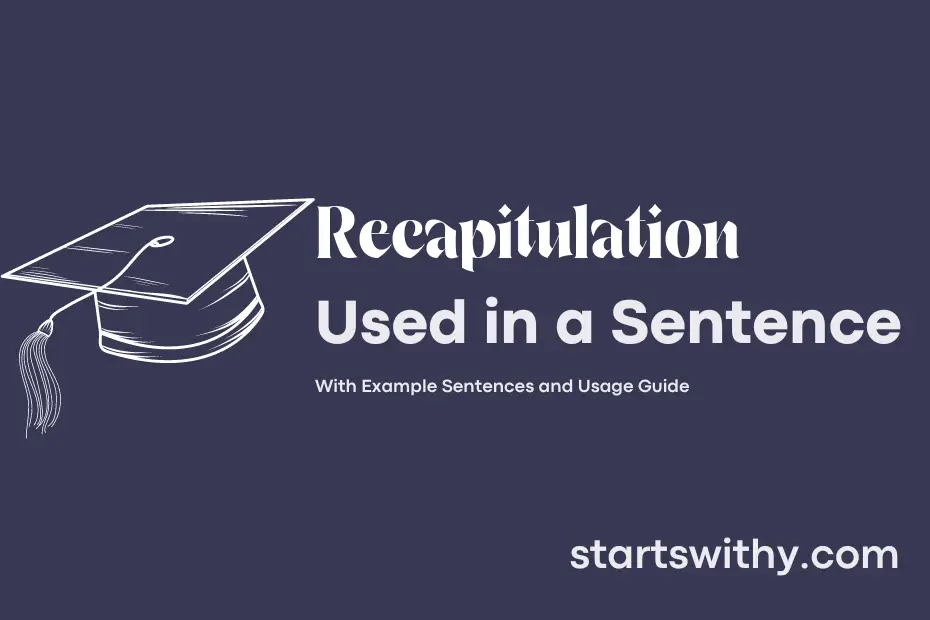Are you looking to reinforce key points in your writing? A recapitulation is a brief summary or restatement of the main ideas or events. It serves as a helpful tool to revisit important information and drive home essential concepts.
In academic papers, presentations, or conversations, a recapitulation can effectively reinforce crucial details and provide clarity for the audience. By succinctly summarizing key points, a recapitulation can enhance comprehension and retention of information.
7 Examples Of Recapitulation Used In a Sentence For Kids
- Let’s have a recapitulation of the story we read today.
- Can you give me a recapitulation of the colors in the rainbow?
- After the lesson, we will do a recapitulation of the numbers we learned.
- Let’s do a recapitulation of the shapes we studied this week.
- Can you do a recapitulation of the fruits we talked about yesterday?
- Before we move on, let’s have a recapitulation of the names of animals.
- Let’s end the class with a recapitulation of the alphabet.
14 Sentences with Recapitulation Examples
- Recapitulation is an essential part of preparing for final exams.
- Make sure to include a thorough recapitulation of all the major points in your study notes.
- Before the end of the semester, it’s recommended to do a thorough recapitulation of all the topics covered in class.
- It’s important to schedule time for recapitulation in your study timetable.
- A good way to retain information is through regular recapitulation of previously studied material.
- Recapitulation can help reinforce your understanding of complex concepts.
- Adding a section for recapitulation at the end of your study sessions can improve retention.
- Reviewing past exam papers is a great form of recapitulation before a test.
- Utilizing flashcards for recapitulation can be an effective study technique.
- A group study session can be beneficial for recapitulation as different perspectives can aid in better understanding.
- Integrate recapitulation of practical experiments into your lab notebook for easier revision.
- Consider creating a mind map to aid in the recapitulation of interconnected topics.
- Skimming through highlighted sections in your textbooks can help with quick recapitulation before an exam.
- Use online resources to supplement your recapitulation of challenging subjects.
How To Use Recapitulation in Sentences?
Recapitulation means summarizing the main points or events that have been discussed or presented. When utilizing recapitulation in a sentence, it is essential to provide a concise review of the key information without introducing any new details.
For beginners, it is crucial to start by clearly identifying the main idea or argument that you want to recapitulate. Make sure to include all the significant points that support this main idea. Avoid going into too much detail or adding extra explanations. Keep the recapitulation brief and to the point.
To use recapitulation effectively in a sentence, consider using transitional words or phrases such as “in conclusion,” “to summarize,” or “to sum up.” These phrases signal to the reader or listener that you are about to provide a recap of the main points.
Remember to maintain a logical order when presenting the recapitulation. Start with the most important information and gradually work your way through the supporting details. This will help the audience follow along and better understand the key points being reiterated.
Overall, the recapitulation should serve as a clear and concise reminder of what has been discussed or presented, reinforcing the main idea without overwhelming the audience with unnecessary information. Practice using recapitulation in your writing and speaking to improve your ability to summarize information effectively.
Conclusion
In conclusion, a recapitulation in writing serves as a concise summary or restatement of key points previously discussed. By revisiting essential ideas in a condensed form, a recapitulation aims to reinforce understanding and emphasize crucial information for the reader. Through the use of this literary device, writers can effectively enhance comprehension and drive home the main message or argument of their work.
Whether found at the end of a book, in a concluding paragraph, or within a speech to underline key points, a recapitulation plays a vital role in reinforcing the overall theme or message. By providing a quick review of important details, this technique helps to solidify the main ideas and leave a lasting impact on the audience, making it a valuable tool in effective communication.



